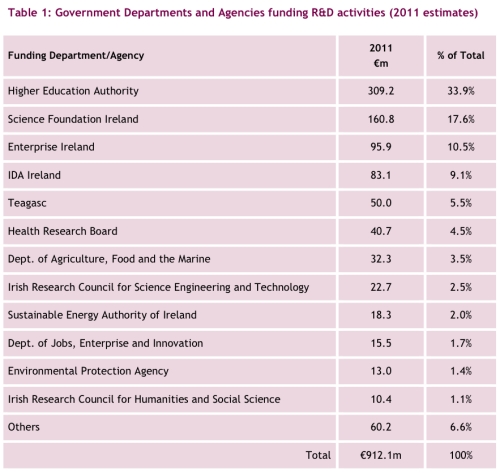The following letter was sent to Science Foundation Ireland from the Royal Irish Academy Committee for Astronomy and Space Sciences in response to the SFI call for consultation concerning its new Agenda 2020 and Operational Plan 2013 documents (mentioned in a previous blog post).
Dear Professor Ferguson,
I write to you as chair of the RIA Committee for Astronomy and Space Sciences,
in response to the SFI call for consultation concerning its new Agenda 2020 and
Operational Plan 2013 documents.
Our Committee has members from all 3rd level institutions (Universities and ITs)
that are active in astronomy research on the island of Ireland; our remit is to pursue
strategic and policy development in research and education within astronomy and the
space sciences on an all-Ireland basis. Hence, funding decisions made by SFI impact
very significantly on the work of our members: indeed, since the programme began
the SFI RFP has played the key role in sustaining astronomical research in Ireland.
Our Committee was originally alerted to a change in SFI funding policy earlier
this year, when it became known that several researchers had their proposals to
the Investigators Programme “administratively withdrawn” – rejected even before
evaluation – because their work did not fall under the 14 areas of prioritization
outlined by the Forfas Prioritization Report.
Our fears were confirmed by the recent SFI decision to fund only those areas falling
under the 14 prioritized ones and/or under SFI’s legal remit.
Whilst there can be no argument that the most significant levels of funding must,
as they have in the past, be provided to research that underpins areas that are likely
to provide economical benefits in the shorter term, we are deeply dismayed by the
decision to withdraw all support for basic, “blue skies” research – research that,
although of the highest standard scientifically, is deemed unsupportable because it
apparently has no immediate, direct economic benefit.
We find the strategic benefit to Ireland of a more tightly focused SFI remit difficult
to understand, especially in the context of the Prioritization Report itself which
states that “a healthy, balanced, sustainable research system supports all aspects
of the research continuum and this cannot be achieved by focusing investment on
only the applied part of the research spectrum”. We agree with the corollary of this
statement – i.e. that by more narrowly focusing its investment, SFI runs the very real
risk of creating an unhealthy and unbalanced research system. This will have serious
implications for many research areas in Ireland.
In the case of Irish astronomy, there are ~30 tenured astronomers working in Ireland,
each leading research groups of various sizes. A recent survey of this community
shows that a total of ~60 PhDs graduated, and ~13 million euro of research funding
was secured, over the last 5 years. The community is very active and retains a strong
international standing, despite that fact that, almost uniquely within Europe, Ireland
has no formal access to any astronomical observing facility.
In addition, astronomy plays an important role in outreach and the promotion of
science at 2nd and 3rd level: it is probably the research area with the greatest impact
on the public imagination, the most powerful tool at our disposal in promoting the
general public understanding of science. The astronomy community in Ireland has
always had a high level of public engagement, and the bedrock of this is the public
awareness of the research carried out by Irish astronomers.
In addition, the existence of astronomers in various Physics Departments, and the
success of the astronomy-related degree programme provided by almost every
University in the country, have resulted in the attraction of a significant cohort of
talented students to the physical sciences in 3rd level who might not otherwise have
considered these options.
Furthermore, ongoing attempts to maximise the financial return to Ireland from its
membership of the European Space Agency (via PRODEX, for example) clearly
benefit from the existence of a viable astronomical community in Ireland.
For example, as recently discussed by Minister Sherlock, “spin-off export sales
from Irish investment in ESA was €35 million per annum and is projected to grow
substantially..”. Ireland needs a well-supported space science and astronomy research
community to help fuel this growth. Such a community is a key component of
the “space science value chain” in Ireland.
Hence, the impact of Irish astronomy is multifaceted, spanning the purely
scientific, educational/outreach and industrial. However, the change in SFI funding
policy outlined above will seriously undermine each of these. Deprived of access
to some level of national funding, the community in Ireland will struggle to remain
viable and internationally competitive. Without it, Ireland will lose a key link to
ESA, NASA and indeed the Horizon 2020 space programme, and will not produce
sufficient PhD graduates to work in the nascent, but growing Irish space-related
industry: we will become less competitive and jobs will be lost to other EU nations.
In summary, we believe that it is dangerously short-sighted to deny funding from
areas such as astronomy and the space sciences (and others, such as particle physics,
pure mathematics, etc) on the basis that they provide no immediate prospect of an
economic return, without taking into account the benefits of this research to other
areas of importance to Ireland’s long term development as a knowledge based
economy.
We urge SFI to broaden its remit to enable it to continue support for fundamental
scientific research. We see no contradiction between this, and the overall agenda of
SFI, expressed by its “Excellence with Impact” motto: SFI should continue to fund
excellent science, which makes an impact. But this impact should be assessed using
several criteria, not just immediate, economic return.
With best regards
Professor Paul Callanan, Chair
Royal Irish Academy Committee for Astronomy and Space Science.


